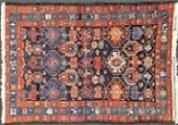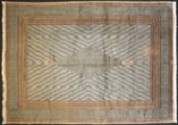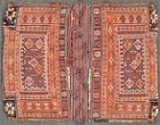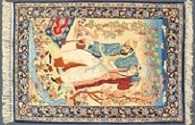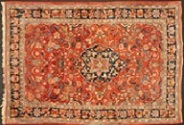Iraq's Elections and Ongoing Strife
May 3 2014-
Many of the 33 millions citizens in Iraq went to the election polls on Wednesday to cast their ballot for prime minister and other members of the 328 seat Parliamentary committee. Those who participated could be recognized by a blue dyed finger which serves as an individual’s marking stamp when selecting who to vote for. This round of elections is the third since the Bush Administration invaded the troubled Arab nation in March, 2003 to overthrow the persecuting dictator Saddam Hussein who had been in power since 1979. The current Prime Minister, Nouri al-Maliki was elected into office in 2006 largely upon the support of the majority number of sectarian supporters belonging to the Shiite form of Islam.
For decades, the Shiites lived under adversarial control of Saddam’s Baathist party which proclaimed itself as Sunni although the authoritarian government often showed little religious values corresponding to the basic tenants of Prophet Muhammad’s 7th century teachings. Shortly upon Maliki coming to power, the Sunni faithful felt a lack of concern and fair representation for their approximately 35% share of Iraq’s population. Policies implemented by Maliki and his close Shiite advisors have led to frequent crack downs on Sunni towns over suspicions of terrorism. Many members of Iraq’s political system who are Sunni and by constitutional decree supposed to be given a fair proportion in parliament as part of the coalition government among Shiite, Sunni and Kurdish members have felt ever more slighted.
With the Sunnis being the religious sect given preferential benefit for decades under Saddam, many of them now feel subjected to motives of revenge by the current Shiite majority leadership. Incidents of Maliki having ordered arrests of Sunni Parliament members upon suspicions of terrorist connections and violent interrogations of Sunni neighborhoods have continued to isolate many of the country's minority population.
The justification according to the prime mininster is that his interests remain as what’s best for the people of Iraq. Maliki himself had long been associated with hard lined Shiite organizations including the Supreme Ayatollah of Iran particularly during a time when fundamental ideology was once considered the only course of action against Saddam’s regime. During the 80’s and 90’s many of the Iraq Shiite faithful turned to their religious brethren in other countries such as Iran for hope. From 1980 to 1988 in the course of the Iran-Iraq War, many hardliner Shiites in Iraq favored and sought Iranian refuge while also growing more resentful against the United States for it’s support of Iraq during the conflict. The Reagan administration’s support of Iraq was the result of US political opposition against Ayatollah Khaemoanei who had under popular support of Iran’s population returned from exile in 1979 to unseat the much detested Shah who was originally given support by the US.
Thus connections of foreign Shiite sympathies run deep in the current Iraqi leadership paradigm. Concerns by the United States for several years leading up to the full American troop withdrawal in 2011 was that Iran was making efforts to exert it’s influence upon Iraq. Those of the fundamentalist Shiite believers in Iraq are likely to look favorably upon the religious decrees ordained by the Ayatollah. In return, the Iranian operatives such as Kud forces of the Iranian Revolutionary Guards were for several years following our Dec. 2011 withdrawal thought to have infiltrated Iraqi society to exert an added degree of influence upon the strife that played out between the Iraqi Sunnis and Shiites.
The level of violence surged in the late part of last year and has continued through 2014 as some of the worst that the country has experienced since the height of self detonating terrorists activity reached it’s peak in 2006-07. The plight of Maliki is that his seemingly biased targeting of Sunni members of the population is due to their preponderance of responsibility in carrying out murderous attacks against civilians.
Maliki’s self glorified asscension to power is thought to have come two years following his initial election as Prime Minister. It was in 2008 that a rival Shiite religious cleric, Moktada al-Sadr began waging a militant uprising mostly in response to the al-Qaeda backed Sunni violence that was wreaking immense destruction upon the people and destroying medieval Shiite holy sites. Strong allegiances to the cleric al-Sadr were maintained by many residents in areas of southern Iraq which quickly erupted into intense battle zones of Shiites against Sunnis and even in fighting among members of the same faith. Having been in office for two years, Maliki flew directly into the center of the fighting and with extensive American military support managed to quell the forceful al-Sadr militia. The troublesome insurgent war that the United States soldiers were thrown first and foremost into combating during the eight years of occupation was complicated even more during the time of al-Sadr’s Shiite uprising. But Maliki's ability to take control of the situation signified a display of governmental order and leadership over the chaos at the time. Since then, the decision making has been heavily determined by top members of the Prime Minister’s inner circle.
How justifiable the tactics of political exclusion and military suspicion that Mliki’s government has shown towards members of Iraq’s Sunni population is largely held to questionable debate. His argument continues to be that he is doing what is best for the country of Iraq. Yet, apparent corruption seems evident through out parts of Maliki’s power.
Whether or not the coalition government between the Shiites and Sunnis can be salvaged regardless of which sect’s leader is elected as it’s newest Prime Minister remains a contested ordeal. Among the Sunnis, they’re strongest candidate is Osama al Nujaifi, the current Parliament speaker. He has vowed to make all attempts at curtailing relations with Maliki as Prime Minister meaning that if either one of the two likely candidates are elected then the chance for an amicable coalition between each side is doubtful.
So still it stands to be seen whether a balanced share of power that may begin effectively channeling the $200 billion dollars of annual oil revenue, second largest in the OPEC countries, can stabilize itself among other much less troubled nations across the Arab Peninsula such as Jordan, Saudi Arabia and others.
Troublesome is neighbooring Syria which remains the most devastated country in the region as a result of ongoing war by the nation’s rebels against the ruthless dictator Bashar al-Assad who has taken all means necessary to defy the citizen’s movement pressuring for his abdication.
Many of the self detonating terrorist attacks in addition to being largely affiliated with the extremist Sunni Muslim members are thought to have arrived from Syria as their currently exists a local faction of al-Qaeda operatives who have infiltrated Iraq to proclaim themselves as al-Qaeda IS(Iraq and Syria).
The Iraqi election results are likely to be announced in the coming days. If Maliki is reelected as expected little change in the political positioning to maintain a Shiite stronghold is likely to occur. Though should more of a balanced cooperation be given a chance to exist either through Maliki or another elected Prime Minister, then maybe the additional security supplies such as military aircraft and high powered weaponry may find their way into the cache of Iraq’s military service which has been an ongoing request by Maliki. It is with additional military capability that the prime minister has suggested would enable his leadership and army commanders to combat the ever fatal insurgent attacks that plague the country.
